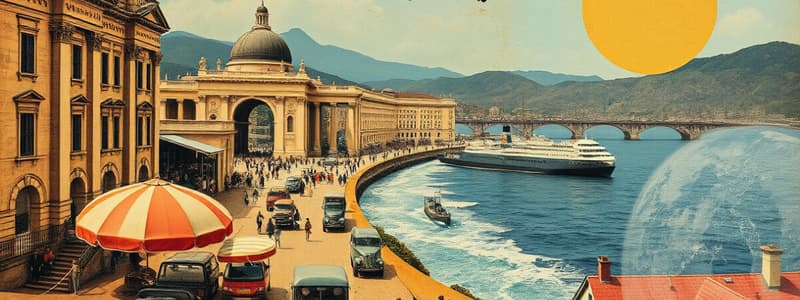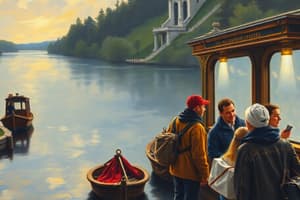Podcast
Questions and Answers
What significant development occurred around 3000 B.C. in Mesopotamia?
What significant development occurred around 3000 B.C. in Mesopotamia?
The development of the wheel.
Which civilization first constructed roadways between cities around 1000 B.C.?
Which civilization first constructed roadways between cities around 1000 B.C.?
- Persians
- Romans
- Egyptians
- Chinese (correct)
Who was the first noted business traveler that pioneered trade routes from Europe to China?
Who was the first noted business traveler that pioneered trade routes from Europe to China?
Marco Polo.
The word 'tourist' appeared in print in the 14th century.
The word 'tourist' appeared in print in the 14th century.
Who founded the first known travel agency, Cox & King?
Who founded the first known travel agency, Cox & King?
In what year did Thomas Cook open the first leisure travel agency?
In what year did Thomas Cook open the first leisure travel agency?
What was one of the reasons for early travel in ancient times?
What was one of the reasons for early travel in ancient times?
The first commercial air flights began in the 1950s.
The first commercial air flights began in the 1950s.
Cruising began in the _____ with the Cunard Lines crossing the Atlantic.
Cruising began in the _____ with the Cunard Lines crossing the Atlantic.
What innovation in the 1886 helped publicize the budding car company that would later become Mercedes Benz?
What innovation in the 1886 helped publicize the budding car company that would later become Mercedes Benz?
Which factor significantly impacted the evolution of leisure travel through history?
Which factor significantly impacted the evolution of leisure travel through history?
Flashcards are hidden until you start studying
Study Notes
History of Tourism
- By the early 21st century, international tourism emerged as a major global economic activity, affecting regions from the Arctic to Antarctica.
- Migratory tribes dating back to 10,000 B.C. sought greener pastures, leading to trade and the development of transportation methods.
- Water transportation was advanced by 5000 B.C. with the creation of canoes and rafts, utilized on rivers, streams, and lakes.
- The invention of the wheel around 3000 B.C. in Mesopotamia marked a significant advancement, enabling carts drawn by oxen for transporting goods and people.
- Wheeled vehicle technology spread to India by 2500 B.C., Europe by 1400 B.C., and China around 1300 B.C.; spoke-wheeled chariots emerged around 2000-1500 B.C.
- By 1000 B.C., the Chinese established city roadways, while the Persians followed suit around 500 B.C., facilitating increased wheeled travel.
- The Egyptians crafted sailboats by 3200 B.C., boosting trade among civilizations, and the Phoenicians pioneered maritime commerce with a fleet trading with Spain by 1000 B.C.
- The Olympic Games starting in 776 B.C. led to travel for sports, setting a precedent for modern mass travel.
- Religious pilgrimages gained momentum after Christ’s crucifixion, with the Roman Catholic Church providing lodging in hospices and monasteries during the Middle Ages.
- Marco Polo was one of the first notable business travelers, navigating trade routes to China between 1275 and 1292 while staying at basic inns.
- Leisure travel transitioned from an elite privilege to a widespread activity over centuries, with young aristocrats undertaking "grand tours" in Europe from Roman times to the 17th century.
- The formal concept of hospitality predates the term tourism, dating back to the 14th century from the Latin "hospes," referring to guests and hosts.
- The term "tourist" appeared in 1772, with "tour" deriving from Greek and Latin roots meaning circle and turn, symbolizing the act of traveling away from home.
- Cox & King, established in 1758, was the first known travel agency, serving the British Royal Armed Forces; Thomas Cook launched the first leisure travel agency in 1841.
- Cook organized the first packaged tour for 570 participants to a religious meeting in 1841 and launched commercial packaged tours with rail tickets and guides by 1845.
- Monaco reinvented itself in the 1850s as a winter resort for the affluent, promoting health and casinos.
- The cruise industry initiated in the 1840s with Cunard Lines operating transatlantic routes.
- The grand tour era spanned from 1880 to 1930, as wealthy Europeans explored Europe as part of their education.
- The rise of rail travel and automobiles revolutionized tourism, highlighted by Karl Benz's wife undertaking a long journey in 1886, promoting his car company.
- In 1952, commercial air travel commenced with flights from London to Johannesburg and Colombo, heralding the jet age and the modern tourism industry.
- The 1950s saw the emergence of Club Med and similar all-inclusive resorts, along with American Airlines’ inaugural transcontinental flight in 1959.
- The Boeing 747, capable of transporting 450 passengers, began operations in 1970, marking a new era in air travel.
Studying That Suits You
Use AI to generate personalized quizzes and flashcards to suit your learning preferences.




